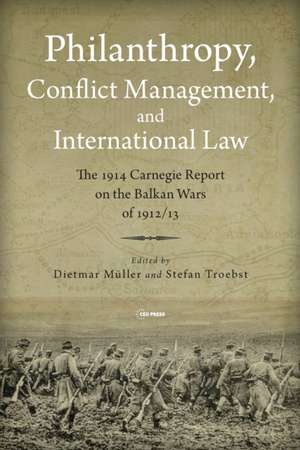Philanthropy, Conflict Management and International Law: Leipzig Studies on the History and Culture of East-Central Europe
Editat de Dietmar Müller, Stefan Troebsten Limba Engleză Hardback – 14 dec 2021
This book centers on the Report of the International Commission to Inquire into the Causes and Conduct of the Balkan Wars, published in Washington in the early summer of 1914 by the Carnegie Endowment for International Peace. The volume was born from the conviction that the full assessment of the significance of the Carnegie Report--one of the first international non-governmental fact-finding missions with the intention to promote peace--requires a deeper exploration of the context of its birth.
The authors examine how the countries involved in the wars handled the inquires of the Carnegie Commission and the role of the report in the remembrance of the wars in the respective states. Although the report considered both the Ottoman Empire and the Balkan nation-states insufficiently civilized to wage wars within the limits of the codes of conduct of international law, this orientalist conclusion can in part be explained by the liberal internationalist strategy of the Carnegie Endowment, and of the commission members' professional, political, and ethnic background. Overshadowed by the outbreak of World War I, the Carnegie Report's direct impact on international arbitration or international criminal law was limited, yet--in the authors' opinion--it ultimately contributed to the further juridification of international relations
Preț: 461.34 lei
Preț vechi: 569.55 lei
-19% Nou
88.31€ • 95.95$ • 74.22£
Carte disponibilă
Livrare economică 01-15 aprilie
Livrare express 15-21 martie pentru 35.38 lei
Specificații
ISBN-10: 9633864232
Pagini: 340
Dimensiuni: 152 x 229 x 26 mm
Greutate: 0.59 kg
Editura: CEU EDUCATIONAL SERVICE NON-PROFIT LLC
Seria Leipzig Studies on the History and Culture of East-Central Europe
Descriere
This book centers on the Report of the International Commission to Inquire into the Causes and Conduct of the Balkan Wars, published in Washington in the early summer of 1914 by the Carnegie Endowment for International Peace. The volume was born from the conviction that the full assessment of the significance of the Carnegie Report--one of the first international non-governmental fact-finding missions with the intention to promote peace--requires a deeper exploration of the context of its birth.
The authors examine how the countries involved in the wars handled the inquires of the Carnegie Commission and the role of the report in the remembrance of the wars in the respective states. Although the report considered both the Ottoman Empire and the Balkan nation-states insufficiently civilized to wage wars within the limits of the codes of conduct of international law, this orientalist conclusion can in part be explained by the liberal internationalist strategy of the Carnegie Endowment, and of the commission members' professional, political, and ethnic background. Overshadowed by the outbreak of World War I, the Carnegie Report's direct impact on international arbitration or international criminal law was limited, yet--in the authors' opinion--it ultimately contributed to the further juridification of international relations
Notă biografică
Dietmar Müller is Historian of Comparative History of European Cultures and Societies at the University of Leipzig. Stefan Troebst is Historian and Slavist. He is Professor of East European Cultural History, Leipzig University.







